- Home
- Gavin Chappell
Our Man in Alexandria Page 3
Our Man in Alexandria Read online
Page 3
‘You think he was insane?’ Flaminius said. ‘He was murdered, after going undercover in the Old Judaean Quarter. Doesn’t that suggest he was onto something?’
Ozymandias shook his head. ‘Julius Strabo went looking for trouble,’ he said dismissively. ‘Seemed he was on a mission to stir up the Judaeans. Maybe someone was behind him, wanted an excuse to wipe them out altogether. Some…’ He paused to spit out of the litter. ‘Some Greek.’
‘You don’t like the Greeks,’ Flaminius suggested.
Did everyone hate everyone else in this city? Greeks hating Judaeans, Egyptians hating Greeks… Romans struggling to keep them all from each other’s throats, while despising the lot of them. It must be that baking hot sun.
‘Who does?’ Ozymandias asked. ‘You Romans don’t like them either, do you? You stole all their culture and now you hate them because their very existence is a reminder of your theft.’
He was an outspoken if soft spoken fellow, Flaminius was beginning to realise. The slaves bore them on down the street, turning to guide them round crowds of voluble Alexandrians heading towards the Hippodrome if the snatches of talk he heard were anything to go by.
Flaminius regarded the Egyptian in silence. Ozymandias had little respect for his late partner, little respect for civilised people like the Greeks or Romans, little respect for Flaminius himself. He reminded himself that Paulus Alexander must see something in this reformed tomb robber. No doubt growing up in the gutters of this great city had given him a few rough edges.
‘I prefer to judge a man by what he does,’ he said at last, ‘not by where he comes from, nor the gods he worships.’
He felt priggish even saying it, and Ozymandias didn’t try to conceal the curl of his lip. This new partnership was not going well.
‘You think Julius Strabo was gulled by someone?’ Flaminius said. ‘Someone who hated the Judaeans and wanted to wipe them out?’
Ozymandias shrugged. ‘Why not? It would take only another massacre and the Judaean people would be finished in Alexandria. Already their temple in Jerusalem has been laid waste. And the Greeks hate them. The Romans too, it seems.’
‘I don’t think the Romans hate them,’ Flaminius protested. ‘Many Judaeans have been granted Roman citizenship, and we don’t do that to people we don’t like. A freedman like you should appreciate that.’ Freedmen had some of the privileges of Roman citizenship, and their children became full citizens. ‘You don’t seem to hate the Judaeans,’ he probed.
Ozymandias shook his head. ‘They have strange customs,’ he admitted, ‘but Greeks and Romans say the same about Egyptians.’
Flaminius sank back against the linen wall of the litter. ‘How did all this come about?’ he asked. ‘It seems Egyptians are second class citizens in their own country.’ He remembered the warrior tribes of Britain with their cattle raids and age-old feuds. It seemed that here, at civilisation’s heart, the same tribal enmities existed, but exacerbated by the people living cheek by jowl.
Ozymandias gestured contemptuously at the passing city with its colonnades and temples. Traffic seemed to have slowed to a crawl. Flaminius considered getting out to walk. It could hardly be slower.
‘This isn’t Egypt,’ the scribe said. ‘Even in the Egyptian Quarter, it’s more Roman than Egyptian and more Greek than either. Out in the Delta you’ll find the real Egypt, or down south in the Thebaid. Among the ruins of long lost cities, and the tombs of the dead pharaohs. That’s Egypt, not this Greek colony.’
‘So it’s a Greek city,’ Flaminius said, ‘or Macedonian, even. Alexander the Great was hardly a Greek himself, being a barbarian in many ways. But this Greek city is inhabited by Arabs and Numidians and Armenians and of course Judaeans. Not to mention the native Egyptians. Rome is a melting pot, of course, and you’ll hear twenty different tongues spoken in a Subura street. But Rome is the mistress of the world.’
‘The world’s mistress?’ Ozymandias gave a barbed laugh. ‘She’s free with her favours, then. I’ve known women be mistress to many men. Whores, more like. Alexandria was like Rome in her own day, before the whore of all the world outstripped her, but that was yesterday to an Egyptian. We’ve been here since Osiris was a boy. You Greeks and Romans are newcomers.
‘How did it come about? Alexander liked the place. Back then there was just a small village called Rachotis and a bay where pirates anchored from time to time. So he had them start building his city. The Judaeans were there from the start. The Egyptians were there long before the start, but that’s another matter. And of course, the Judaeans started out in Egypt, which is why they have so many customs they stole from us, even if they have picked up some strange ideas in their wanderings.
‘The Ptolemies acknowledged that the Judaeans had laws of their own to live by, and they gave over to them two sectors of the city, most especially the Delta Sector. No, nothing to do with the Nile Delta; the five sectors of the city are named after the first five letters of the Greek alphabet: Alpha, Beta, Gamma, Delta, and Epsilon. Delta Sector became the Judaean Quarter, and under the Ptolemies they had their own ethnarch. A king within the quarter.’
‘They were restricted to one quarter of the city?’ Flaminius asked. It sounded as if they had been imprisoned.
‘Not restricted,’ Ozymandias said. ‘Not back then. They like to live their own life and practise their own religion. They don’t want it to be defiled by Gentiles. But at one time they lived throughout the city, and Judaean temples stood on most streets, and they had Alexandrian citizenship as well, so effectively they were as Greek as anyone in the Brucheium. It was just the Delta Sector that was wholly Judaean, and ruled by the ethnarch, not by the Pharaoh. This went on even after the Romans took over. Augustus got rid of the ethnarch and replaced him with a Sanhedrin, a council of elders. But things started to get worse for the Judaeans. Finally, they were confined to Delta Sector. Now they’ve lost control even of that and have been cast out of the city.’
‘You say the Greeks hate the Judaeans,’ Flaminius said. ‘But from what you’ve just told me, the Greeks treated them well.’
‘The Greek Pharaohs certainly treated them well,’ said Ozymandias. ‘Treated them far better than they treated the native Egyptians, who they taxed into penury or a life of crime. But the Greek mob hated the Judaeans simply because they had a different way of life. A dislike for the unlike. Even though the Judaeans soon came to dress like Greeks, speak like Greeks… even had their sacred scriptures translated into Greek….
‘But there were many riots, particularly in the Hippodrome. The Judaeans tended to back the Greens, the Greeks the Blues. Or was it the other way round?’ He shook his head. ‘We Egyptians have no interest in foreign sports; although that being said, my sister enjoys watching the races, however much I try to dissuade her. Anyway, the Greek mob got plenty of opportunities to exercise their hatred when mad Roman emperors began to persecute the Judaeans across the empire. That was when it all started to go wrong in Alexandria.’
Flaminius grunted. He peered out of the gap in the curtains. Fascinating as he found Ozymandias On Alexandrian History, the litter seemed to have halted. What was the matter with those slaves?
—4—
The whole street had come to a standstill. Peering towards the Gate of the Sun, Flaminius saw unmoving crowds of people, the usual Alexandrian ethnic diversity a colourful sight, if frustratingly immobile. He glared at the forward slave, a Galatian with skin so tanned and hair so fair he looked like some kind of exotic vegetable.
‘What’s the hold up?’ Flaminius barked.
‘Sorry, sir,’ said the Galatian, speaking Greek with an accent that reminded Flaminius of his last posting. ‘Can’t quite see. Seems to be something to do with the races this afternoon.’
‘Oh, the races,’ Flaminius muttered, pulling his head in like a cross tortoise. He’d followed the chariot races at the Circus Maximus when he was a student, spending a year or two as a fanatical Green, but in recent years he’d been too bu
sy in his work to pay much attention to charioteering. Now it all seemed very strange. There was a tension in the atmosphere, as if a thunderstorm was imminent. He remembered that kind of excitement from the old days. It usually meant a fight was brewing.
But the chariot races in the eastern provinces, where Greek culture was strong, meant so much more than they did in Rome. It was like a kind of cult, a cult of hatred and violence.
‘What’s happening?’ Ozymandias whispered.
‘The races,’ said Flaminius with a shrug.
Ozymandias shook his head. ‘They’re not till later,’ he said. ‘It can’t be them.’
‘That’s what the slaves said, anyway,’ Flaminius snapped. ‘Some disturbance up ahead. It’s stopping us getting to our destination.’
Ozymandias thrust his head out. Then he climbed down from the litter and gazed around. Flaminius joined him.
‘Is there any way we could get there by the back streets?’ Flaminius asked. ‘I’d like to see the murder scene before sunset, if possible.’
Ozymandias scowled. ‘That’s what I’m looking for.’ He shook his head. ‘These fools have got us penned up between one side street and another. Otherwise the palace of the Ptolemies is in our way. Maybe you could use your lance-head brooch to get us through…’
He broke off at a roar of shouting from down the street. Flaminius strained to see what was happening.
All that was visible down here was violent movement, crowds shoving and pushing at each other. It looked like they were on the verge of a riot. What had caused it, Flaminius didn’t know. It was a while since he’d last been on riot control duty. He looked up and down the street for signs of legionaries, but none were visible.
‘We’re a long way from the camp,’ Flaminius muttered. ‘Why did they build it outside the city?’
Ozymandias shrugged carelessly. ‘There are smaller forts through Alexandria,’ he said, ‘dating from the days of the Ptolemies. Legionaries are stationed there, too, not to mention the civic guard. They’ll turn up soon, and then we’d better get out of the way.’
Flaminius flung him an impatient look, then began forcing his way through the stationary crowd. ‘Out of my way,’ he said. ‘Out of my way. Imperial business!’ It seemed to impress the Alexandrians not a jot.
Hearing hurrying footsteps from behind, he turned to see Ozymandias coming after him.
‘Are you out of your mind?’ To Flaminius’ surprise, the Egyptian looked genuinely frightened. ‘Don’t you know how dangerous this city is?’ he added, laying his hand on Flaminius’ forearm. ‘I should know, I used to be one of the dangers! But I thought my stories should have got it into your thick Roman head that the streets of Alexandria are risky enough at the best of times, even more so on race days.’
Flaminius shook off his hand. ‘I want to see what’s going on.’ The shouting and clamour continued in the distance. ‘The commander of the civic guard needs to know about this, let alone the tribune back in camp. It sounds serious.’
‘It’s not our business,’ argued Ozymandias. ‘Paulus Alexander said that I was to look after you. He doesn’t want a hair on your noble Roman head harmed. That’s what he told me. And I’m not to allow you to get anywhere near any kind of disturbance.’
Flaminius gave a bark of laughter. ‘I’m a Roman tribune of the commissary,’ he told the Egyptian, ‘not some mewling babe just out of swaddling clothes. I’ve known danger in the past. The druids, the Britons, they’re what I’ve fought in recent years. A few race enthusiasts run amuck doesn’t compare. When we get back to the palace of Hadrian I’ll tell your commander he can drop the mother hen act. I’m a Roman legionary, not a spoilt eastern courtesan.’
Ozymandias listened impatiently. ‘Let’s just get back to the litter,’ he said. ‘We can return to the palace and tell them what’s happening, assuming they haven’t heard already. One Roman, however tough and experienced he claims to be, isn’t going to stop a riot singlehanded.’
And it was a riot now, Flaminius was certain. Even though he could still see nothing definite over people’s heads, smoke was in the air and he could hear the crackling of flames. Someone had set fire to a shop, he surmised.
‘Very well,’ he told Ozymandias. ‘We get back to the litter, then find some way back to the palace, and your commander. We won’t be able to get to the Old Judaean Quarter if there’s a riot going on.’
The crowd was so close that it took them several minutes to force their way back to the litter, even with Flaminius shouting, ‘Imperial business!’ and showing his lance-head brooch. No one seemed impressed this time, either, and even if they were, they couldn’t move, the press was so great. Flaminius began to feel something of a fool.
He felt even more foolish when they got back to where they’d left the litter to find it had vanished completely.
‘Where have they gone?’ he said, staring round the crowded street. Had the slaves been moved away by the press of the crowd? He couldn’t see any sign of them. Had they been foolish enough to run away?
Ozymandias seemed to think so. ‘Your slaves have escaped,’ he said. He was pointing at an abandoned litter on the far side of the crowded street.
‘Why didn’t you stay with it?’ Flaminius wanted to know. ‘Alright, don’t remind me. Paulus Alexander told you to keep an eye on me.’ And what else had the commander said? ‘I’m not worried about the slaves, they’ll soon be picked up by the slave catchers. Besides, they weren’t mine. I requisitioned them, and the litter too.’
‘We’re still stuck here,’ Ozymandias said, indicating the crowd that surrounded them. Suddenly it lurched like alive thing, people were shoved back by others, lines of people, staggering and stumbling back towards the two men. Flaminius and Ozymandias couldn’t help but join the rout.
At last the pressure eased off and they were able to stop running. Flaminius could not see what had begun the movement, but it was clear that the riot was growing somewhere up ahead. Now the street was beginning to clear, with some people heading away from the rioting in the eastern quarter. But the way to the west was still blocked. Or was it? Flaminius thought he could see enough room between the standing figures to make his way down the street.
‘Come on,’ he told Ozymandias, and led the unwilling Egyptian through the crowd.
The smell of smoke and burning wood hung rank in the air, but the crowd seemed quiescent. They couldn’t be far from the Old Judaean Quarter, and as soon as they got to the ruined temple, they could begin the investigation in relative peace and quiet, whatever disturbances the city at large might be experiencing. Ozymandias was right, Alexandria was a dangerous place.
Now he could hear shouts and the sound of scuffling. He was about to force his way through the crowd in that direction, when Ozymandias halted him again. This time the Egyptian was pointing at a small side street, little more than an alleyway, that led off the main street to the north.
‘If we can get up that way,’ Ozymandias told him, ‘it leads to the old Macedonian palace. We can make our way round it and then we’ll find ourselves on the edge of Delta Sector—the Old Judaean Quarter.’ Flaminius looked in the direction of the fighting. ‘Unless you want to waste time getting mixed up in civil disturbance,’ the Egyptian said sarcastically. ‘Don’t you want to investigate my colleague’s murder? I know I’d rather do that than find myself on the wrong side of an Alexandrian riot.’
‘Very well,’ said Flaminius. ‘I can’t understand why Paulus Alexander or the prefect doesn’t send troops to settle this riot. But yes, you’re right. It’s really not my immediate concern.’
They changed direction, forcing their way through the press into the side street. Here it was cool and shaded and almost deserted. Standing at attention in the middle of the street, at a loss, was a vexillation of legionaries.
‘Wait,’ Flaminius said to Ozymandias, decisively. He walked up to the centurion in command of the legionaries.
‘What are these men doing here?’ he dem
anded. ‘There’s a riot out in the streets. Why are you just standing here?’
The centurion saluted, although he peered suspiciously at Flaminius, not recognising the tribune. ‘Waiting for orders, sir,’ he said. ‘We were mobilised from our post in the Macedonian camp, since it seems the streets are in uproar all the way between here and the Old Judaean Quarter, but then our superior officer went off to speak with the commander of the civic guard. We’ve been standing here waiting ever since.’
‘Never mind that now,’ Flaminius said. ‘We can’t wait any longer. You’re to take your men and crush the riot. The streets need to be made safe to walk down!’
The centurion, a typically beefy fellow with a broken nose, shook his head. ‘Can’t do that, sir,’ he said. ‘The officer told us to wait.’
He looked Flaminius up and down. The tribune noted with approval that the man didn’t wear kohl. The tribune on duty in camp had been innocent of all cosmetics, too. But Flaminius wasn’t getting a very positive impression of his new legion.
‘I don’t know you, young sir,’ the centurion went on. ‘You’re not a member of the legion and you look like a civilian. I can’t take orders from you, however bad the situation. Terribly sorry.’
Flaminius looked pained. ‘For your information, centurion,’ he barked, looking at the man as if he was something extremely nasty he had just stepped in, ‘I have this day been posted to your legion and I hold the rank of tribune. What’s more,’—he tapped on his lance-head brooch for what seemed like the hundredth time that day— ‘this gives me the authority to requisition you and your men.’
The centurion’s eyes bulged on recognising the insignia, and he added in a shaken voice, ‘Yessir.’ He saluted. ‘At once, sir. Just as you command, sir.’ He took off his helmet, mopped his brow, then turned to his men. ‘You heard the tribune.’

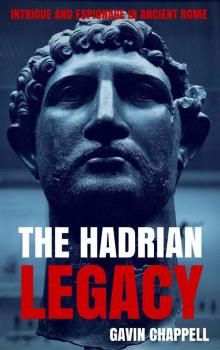 The Hadrian Legacy
The Hadrian Legacy On Hadrian's Secret Service
On Hadrian's Secret Service Murder in Hadrian's Villa
Murder in Hadrian's Villa The Sword of Wayland
The Sword of Wayland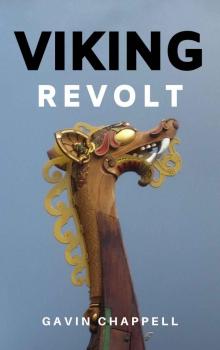 Viking Revolt
Viking Revolt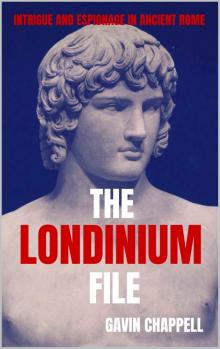 The Londinium File
The Londinium File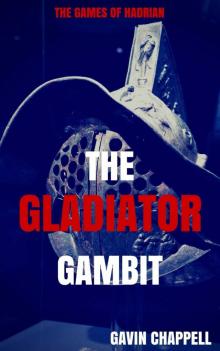 The Gladiator Gambit
The Gladiator Gambit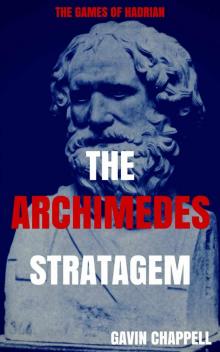 The Archimedes Stratagem
The Archimedes Stratagem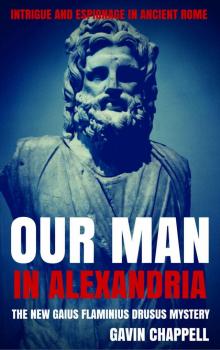 Our Man in Alexandria
Our Man in Alexandria Into the Void (The Dungeoneers)
Into the Void (The Dungeoneers)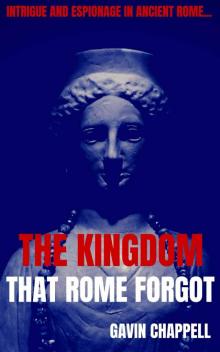 The Kingdom That Rome Forgot
The Kingdom That Rome Forgot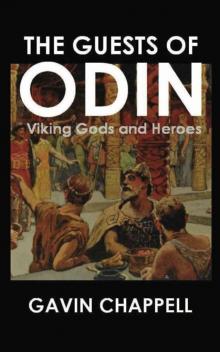 The Guests of Odin
The Guests of Odin